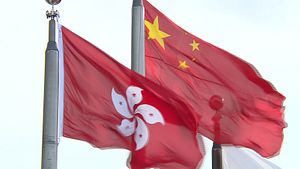On August 19, the U.S. State Department announced that Washington was ending its extradition agreement with Hong Kong, as well as an agreement covering tax exemptions for international ships. It was the latest step in making good on U.S. Secretary of State Mike Pompeo’s May 27 declaration that Hong Kong should no longer be considered autonomous.
“The Chinese Communist Party has taken drastic steps to erode the high degree of autonomy that Beijing itself promised to the United Kingdom and the people of Hong Kong for 50 years under the UN-registered Sino-British Joint Declaration,” the statement said. “President Trump has made clear that the United States will, therefore, treat Hong Kong as ‘one country, one system’… suspending and eliminating preferential treatment for Hong Kong.”
The State Department statement noted in particular that the decision was made out of “deep concern regarding Beijing’s decision to impose the National Security Law, which has crushed the freedoms of the people of Hong Kong”.
On May 22, China’s National People’s Congress empowered its Standing Committee to write and pass new national security legislation for Hong Kong, rather than waiting for Hong Kong’s own legislature to do so. The new law, criminalizing secession, subversion, terrorist activities, and “collusion with foreign and overseas forces,” was passed on June 30 and took effect on midnight July 1 (not coincidentally, the anniversary date of Hong Kong’s return to Chinese sovereignty). The law contained a number of concerning provisions, including providing for the operation of Chinese security services within Hong Kong and the application of the law to citizens of any country for their activities anywhere in the world.
The law’s application since then has done nothing to reassure critics, with political activists and a media mogul arrested. Slogans tied to the mass protests of last summer were also outlawed under the law, as were the once-ubiquitous “Lennon Walls”.
In response to the new Hong Kong national security law – and especially its claim to apply globally — Canada, Australia, the U.K., and New Zealand suspended their extradition treaties with Hong Kong in July. France decided in early August not to ratify a pending extradition agreement with Hong Kong. The United States had threatened to end its treaty earlier as well; now it’s official.
In the earlier cases of Canada, Australia, the U.K., and New Zealand, China responded by promptly suspending extradition treaties and “criminal justice cooperation agreements” between Hong Kong and its previous partners. The U.S. move sparked a similar response, with China suspending the named agreements on its end as well.
Hong Kong’s government also issued what it described as a “severe reprimand” against the U.S. announcement, which accused the United States of having “politicized juridicial cooperation.”
“The move by the U.S. does not only smack of political manipulation and double standards, but is also gross interference in China’s internal affairs and a grave violation of international law and basic norms governing international relations,” the government’s press statement read.
Likewise, Chinese Foreign Ministry spokesperson Zhao Lijian slammed the U.S. move. “Hong Kong affairs are China’s internal affairs and no external force has any right to interfere,” he said at a press conference on Thursday. “China urges the U.S. side to immediately rectify its wrong decision, stop having a hand in Hong Kong affairs and China’s other internal affairs, and refrain from moving further down the wrong path.”
Later, Zhao addressed all countries that have suspended previous agreements with Hong Kong: “By imposing so-called sanctions, they wish to force the Chinese government to change our position, but it is only a pipe dream.”
On July 14, U.S. President Donald Trump issued an executive order declaring, “It shall be the policy of the United States to suspend or eliminate different and preferential treatment for Hong Kong to the extent permitted by law and in the national security, foreign policy, and economic interest of the United States.”
The actual implementation of that policy has resulted in a steady drip of smaller steps, including an earlier announcement that goods imported from Hong Kong must now be labelled “made in China.” Wednesday’s official scrapping of the extradition treaty is one more nail in the coffin on the United States’ special treatment for Hong Kong. Other areas covered in Trump’s executive order include revoking Hong Kong’s special exemptions to export controls on military and dual-use technologies; treating Hong Kong passport holders the same as Chinese passport holders; and ending training programs for members of the Hong Kong police.
































